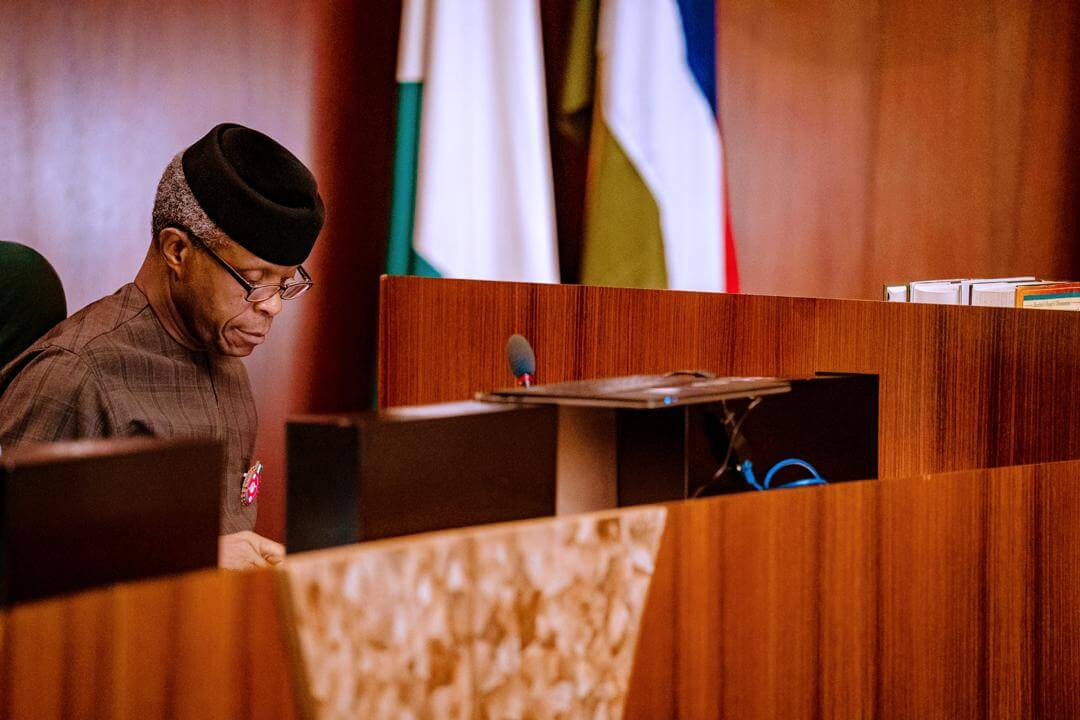The Federal Government has disclosed plans to exempt minimum wage earners from the payment of Personal Income Tax.
Vice President Yemi Osinbajo said this on Monday at the 26th Nigerian Economic Summit currently ongoing in Abuja.
Advertisement
Those that are expected to benefit from his exemeption are workers that are earning the current minimum wage of N30,000 monthly.
He said the exemption had already been provided for in the Finance Bill which had been sent to the National Assembly for legislative scrutiny.
The VP said the exemption was part of measures aimed at stimulating the economy and reducing the burden of hardship caused by the persistent rise in the prices of goods and services on Nigerians.
In addition to the positive interventions in the Finance Bill to further boost economic activity, Osinbajo said the government had made provisions for reduction in duties on tractors, motor vehicles for the transportation of goods and persons.
Advertisement
He also said provision has been made for exemption of small companies from payment of education tax under the Tertiary Education Trust fund for companies with less than N25m turnover.
As part of measures to stimulate productivity, the VP told the gathering that a proposal is being made for a 50 per cent reduction in minimum tax; from 0.5 per cent to 0.25 per cent for gross turnover for financial years ending between January 1st, 2020 and December 31st, 2021.
He added that there are plans also to grant tax relief to companies that donated to the COVID-19 relief fund under the private sector coalition.
He said, “These provisions which complement the tax breaks given to small businesses last year will not only further stimulate the economy but are also a fulfilment of promises made to take steps to help reduce the cost of transportation and the impact of inflation on ordinary Nigerians.
“There is a speedy pathway out of the current recession if we quicken the implementation of the economic sustainability plan. In addition with what we have done for MSMEs, the increased jobs and local production from agriculture, housing and solar installations will serve to further boost the economy.
Advertisement
“These programmes will further improve sectors that are performing well such as telecommunications and information services which grew by 17.3% in the 3rd quarter and the finance and insurance sector, agriculture, and construction.
“Of course, an improvement in global economic conditions including the restoration of global supply chains and resumption of exports and remittances should enable a V-shaped recovery.”
Osinbajo called on the private sector to complement these efforts by making maximum use of the provisions of the Economic Sustainability Plan and the Finance Bill when it is passed by the National Assembly and also by retaining and creating jobs so as to keep people at work.
He added, “It is important for the private sector to play a key role as we work together to identify national priorities and try to influence our future national trajectory.
“It is our conglomerates, firms, companies and businesses that must make use of existing opportunities while adjusting to changing global realities in trade and finance, geo-politics, digital technologies and the environment amongst other things.”
He described the theme of the summit, ‘Building Partnerships for Resilience’ as apt since it was coming at time when the country is faced with the serious challenge of combating COVID-19 as well as the current economic crisis.
Advertisement
He said, “It is no longer news of course that the economy officially entered into recession with the release of the 3rd quarter figures on Gross Domestic Product by the National Bureau of Statistics which showed a decline in growth by -3.62 per cent in that quarter.
“We must bear in mind that this decline was after 12 successive quarters of positive growth and came about as a result of the severity of the global downturn caused by the COVID-19 pandemic including lockdowns, disruption in global supply chains, business failures and rising unemployment.
“We can all recall of course that during the lock-down, farming did not take place, businesses were closed, schools were closed as were hotels and restaurants.
“Also, airlines stopped flying while inter-state commerce was disrupted. the economy only began to recover when these activities resumed and if we are able to sustain the nearly three percentage point increase from the second quarter decline of —6.1 per cent the performance in the 4th quarter could take us into positive territory.
“It was to mitigate this impact that the Federal Government introduced the Economic Sustainability Plan. All the programmes in the ESP are reliant on the private sector playing a key role in creating and conserving jobs and the production and delivery of services in agriculture, housing, solar power, and digital technologies to mention just a few of the sectors. “



